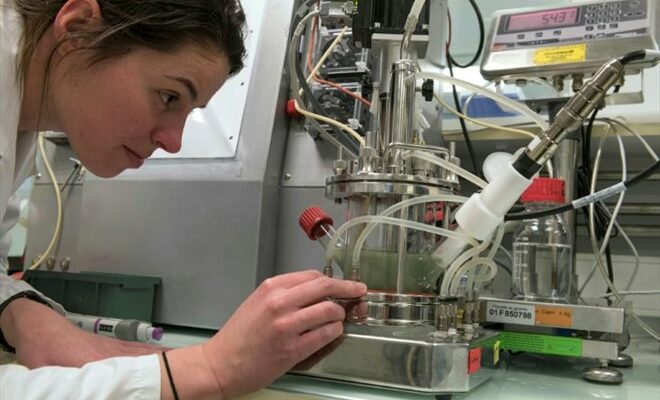The logo of the Carbios company, specializing in the enzymatic recycling of PET plastics and polyester, photographed in Clermont-Ferrand, September 29, 2021 (AFP/Archives/Thierry ZOCCOLAN)
Until now, our polyester clothing ended up incinerated or in landfill. For two years, however, a start-up from Clermont-Ferrand installed on a Michelin wasteland has presented itself as the only one in the world to be able to biologically recycle synthetic fibers, so that they can be used to weave new yarns.
It is on land vacated by Michelin that we visit the Carbios industrial demonstrator, currently being finalized. The young company is preparing to receive its first ton of polyester clothing for recycling, collected by a Parisian start-up, Weturn.
“Until now, there were no enzymatic recycling solutions in France; all the polyester we collected was destroyed. There were no other solutions. It was used as energy,” he said. that is to say burned, explains Sophie Pignères, founder of Weturn, present last Friday during a visit in the presence of the Minister of the Economy Bruno Le Maire.
The objective is to replace technical textiles from Asia, often made from plastic bottles. The idea of being able to truly recycle clothing fascinates the textile industry.
“We are the sector that was the first to be globalized, we are the sector considered to be the most rotten on the planet, we are going to show that it is possible to make textiles in a circular economy, accessible and virtuous. We are going to show example!”, exclaims Éric Boël.
He manages Nouvelles Fibers Textiles, a factory based in Amplepuis (Rhône). Its goal: to weave the links of a recycling chain for synthetic textiles, the famous polyester which piles up in landfills. Its basic molecule is identical to that of mineral water bottles, polyethylene terephthalate or PET.
– “The circle is complete” –
For two years, Mr. Boël’s automated end-of-life textile sorting plant has supplied used polyester to the Carbios demonstrator, where enzymes will break down the complex PET molecules.

A clothing dump at Old Fadama in Accra, Ghana, November 15, 2023 (AFP/Archives/Nipah Dennis)
Currently, less than 1% of the fabrics that make up our clothes are recycled to make new ones, according to the European Commission. Only 22% is collected to be reused or recycled — mainly into rags, padding or insulation, but almost never into new fibers used to make polyester clothing.
Weturn specializes in rescuing the destruction of unused textiles, dormant stocks and “everything that was once incinerated for decades all over the world” underlines Sophie Pignères.
Since the AGEC law on the circular economy adopted at the beginning of 2020, Weturn has been collecting unsold items from the luxury or mid-range sector, helping brands to comply with the anti-waste law which prohibits the destruction of unsold items.
The textiles are recovered, sorted then sent to recycling channels, depending on the material. Until now, the company refused polyester, because “we did not know how to process it”.
Its merger with Carbios should help bridge the gap. “We can collect 20 tonnes of polyester per year,” she says.
At the end of the chain, textiles will become new yarns to develop new textile collections, for technical, outdoor or luggage use. Then she will sell them to their original customers, those from whom the recycled materials come: “the loop is closed” breathes Sophie Pignères.
– “We franchise enzymes” –
At the end of 2025, Carbios will launch its first full-scale factory, in Longlaville, in Meurthe-et-Moselle, with the global PET giant Indorama. By 2027, the company hopes to process 50,000 tonnes of waste per year.

A technician supervises chemical manipulation on a Carbios reactor, in Saint-Beauzire (Puy-de-Dôme), April 1, 2019 (AFP/Archives/Thierry Zoccolan)
Then, “instead of buying petrosourced raw material, companies will buy raw material from Carbios. Our first factory will quickly be saturated in terms of production, we will have to quickly set up others” , predicts Emmanuel Ladent, general director of Carbios.
“We plan to license the technology. People are going to buy the technology to set up factories themselves, we have a lot of ongoing discussions for these licenses with plastic and waste partners, French and global”: “The Carbios model is a bit like McDonald’s, except that we franchise enzymes and technology.
© 2024 AFP
Did you like this article ? Share it with your friends using the buttons below.




